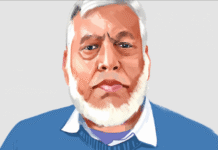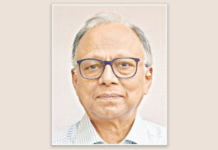Sadeq Khan
After the express distrust and disapproval of the Opposition 18-party alliance of Bangladesh by the Indian security establishment, the message of which was transmitted in the form of an article in The Telegraph of Calcutta on June 25 entitled “Delhi doesn’t lose sleep as Khaleda scores”, disturbing noises are also emanating from the mainstream opposition political establishment of India, characterising Bangladesh as such to be a potent threat to India. The Telegraph commentary was made after the resounding victory of mayoral candidates put up by the BNP-led Opposition alliance against the ruling grand alliance candidates in 4 major city corporation elections of Bangladesh.
Fall of “second bastion”
Since that commentary, another city corporation election was held in Gazipur, adjacent to the capital and known as the “second bastion” of Awami League after Gopalganj, the birthplace of the founder-President of the nation-state, late Sheikh Mujibur Rahman, whose daughter is now the incumbent Prime Minister, Sheikh Hasina. That “bastion” also fell to a surge of voter antipathy towards the ruling party.
The winning 18-party camp is buoyant with solid expectations of a thumping majority in the next general election, if a level playing field is maintained in polls. But the Opposition camp remains adamant that its entire fold would not only boycott but also disrupt the government’s declared intent to exercise general elections with Sheikh Hasina continuing to hold all Executive powers of the State until the next Prime Minister is elected. That proviso about the elected Prime Minister continuing in office during transition of power was reinforced in the Constitution unilaterally by the current regime on the strength of a court observation and its brute majority in parliament, by the Act of Fifteenth Amendment, which also changed an inscription in the preamble of the Constitution rephrasing American-style “In God We Trust” in Bengali Islamic jargon.
Bloody midnight raid on Hefazat-e-Islam
The vast body of avowedly non-political Islam championed by Hefazat-e-Islam, a three-year old umbrella organisation of Madrassa students and teachers and Muslim preachers, has challenged that amendment as unethical and illegal, since it was a basic change that needed to be endorsed by referendum. They held massive gatherings across the country and in the capital, which they blockaded on May 5 at all highway entry points demanding amongst other things the reinstatement of the inscription of Trust in Allah in the Constitution. Their lawful assembly in the commercial district of Motijheel in Dhaka, which turned into an overnight sit-in that day, was however attacked and dispersed by a bloody midnight raid by a contingent of ten thousand armed police, RAB and BGB, putting out all electric lights in the area and chasing out the rural men blinded by teargas smoke, who ran helter-skelter trampling over sleeping bodies and groping for safe exit.
Thus suppressed, the survivors of the Hefazat’s May 5 assembly, who called the incident a midnight massacre, have remained on the run from indiscriminate police raids in the homes and work-places of all known or suspected Hefazat sympathisers under gang cases filed against unnamed hundreds of thousands of participants in May 5 Hefazat activity. These acts of suppression by the government have prevented so far the regrouping of Hefazat activists on the streets, but the laments of pious Hefazat leaders complaining of foul play and massacre by “cowardly” armed law-enforcers against unarmed squatters after the assembly have reverberated in every nook and corner of the nation-state, and shocked the country people. In consequence, the fold of the 18-party Opposition camp has expanded to include voters who have been deeply alienated by the government’s brazen abuse of coercive powers of the State against peaceful Hefazat assembly.
Presumably, the fold of the Opposition is also inflated now by families and friends of 84 lakh Grameen Bank owner-members, whose rights and capital savings this government has been long manipulating to take over in an unabashed manner. The long list of disenchanted voters now under the Opposition fold includes also those affected by a series of share market scams engineered by people close to the ruling coterie. Those affected by Hallmark and Destiny scams add to the above numbers, as do those who suffered at the hands of rent-seekers, kidnap gangs, contract-killers, land-grabbers, protection rackets, and other acts of extortion practised by retinues of those in power. Some constitutional re-writing demanded by Hefazat leaders also reinforce the firm demand for constitutional reinstatement of the non-party Caretaker government system for transition of power, put as a pre-condition for free and fair elections by the Opposition 18-party alliance. The tide of public disaffection with the ruling alliance in the 5 city corporation polls thus in effect highlights the isolation of the ruling coterie’s position in the simmering constitutional crisis over transition of power.
But Sheikh Hasina is not ready to move an inch from the terms of the Fifteenth Amendment that secures her continuing as chief executive of the state during transition of power. She has cut short her foreign trip in U.K. and Belarus to return to Dhaka and rejuvenate her “defeated” party. While abroad in U.K., diplomatic sources close to Indian High Command with eyes and ears in London suggest, Sheikh Hasina had particularly espoused her “personal insecurity” under any caretaker regime as she was imprisoned after 1/11, or under any “terrorist” BNP-Jamat regime under one of which she was subjected to 25 August 2004 assassination attempt by a collusive grenade attack. High-level Indian functionaries are said to be advocating diplomatic cognition of Sheikh Hasina’s personal security concerns as well as “terrorist” inclinations and associations of the new opposition ambience in Bangladesh augmented by inclusion of Hefazat fundamentalists. Some Western capitals are said to be ready to lend ear to this line of argument. As such, the implications of the five city corporation elections in Bangladesh may be viewed by them through coloured lenses, allowing time and energy to Sheikh Hasina to continue to play on her harp.
But what is more alarming is that some Indian politicians are beginning to raise the bogey of security threat to India itself from the socio-political ambience of Bangladesh, irrespective of the evident trend of a transition of power in which “pro-India” policy-makers may lose ground.
“Muslim Jansankhya: Ek Chinta”
In a book-release function on July 8 this year, Subramaniam Swamy, President of Janata party, squarely accused Bangladesh for causing social-anthropological imbalance in India by unrestrained migration. In the publication entitled “Muslim Jansankhya: Ek Chinta” in Marathi and Hindi, he said: “Growing population among Muslims in India is due to the migration from Bangladesh. The neighbouring country needs to be firmly told to take back their people.” After the massacre of Bangali-speaking farmers in Assam riots in 2012, Subramanian Swamy had claimed that illegal Bangaldeshis will turn Assam into another Kashmir and destabilise the whole north east challenging the integrity of India.
He said that Bangladesh(/Pakistan) was created for Muslims on the premise that they cannot live with Hindus. But since Muslims from Bangladesh have entered into India and living with Hindus so the reason for the existence of a separate Muslim country doesn’t exist. So, Bangladesh should return land in proportion to the Muslims that have immigrated into India. 1/3rd of Bangladesh. Or, invade Bangladesh to occupy that land.’
Vulnerability of Bangladesh
The latest Indian threat perception from Bangladesh comes not from a regional alliance leader like Subramanian Swamy, but from the mainstream Opposition in India, the Bharatiya Janata Party, which is the next most potent contender for power in Delhi. After the recent serial blasts in Mahabodhi temple in Bihar, India, a spokesman of the BJP told the Indian media that the unexpected and unresolved blasts last week were symptomatic of a possible new dimension of terrorist threat to India, that of Bangladeshi terrorists enraged by anti-Muslim riots in Myanmar and targeting Buddhist holy sites in India for retaliation. However far-fetched such threat perceptions might in reality be, it exposes the vulnerability of Bangladesh to hyperboles of misconstrued policy-making in India, and requires the Bangladeshi political elite on all sides of the current tangle to be wary.
Source: Source: Weekly Holiday









